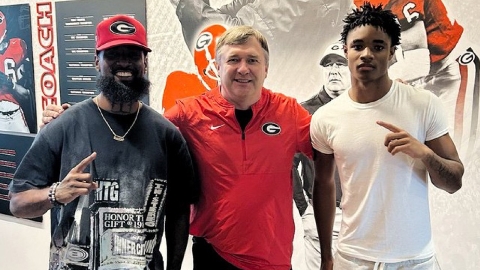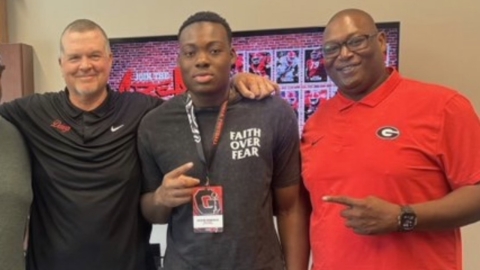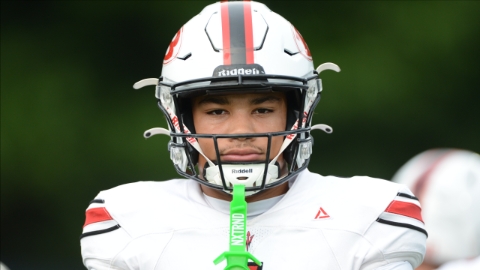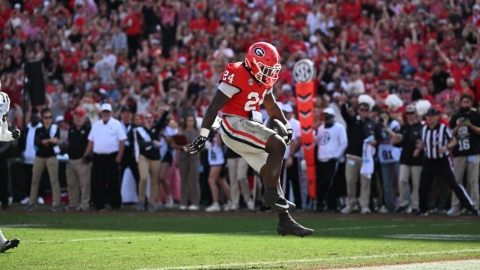Kirby Smart: "We've Never Said 'Repeat' or 'Defend'. We HUNT."
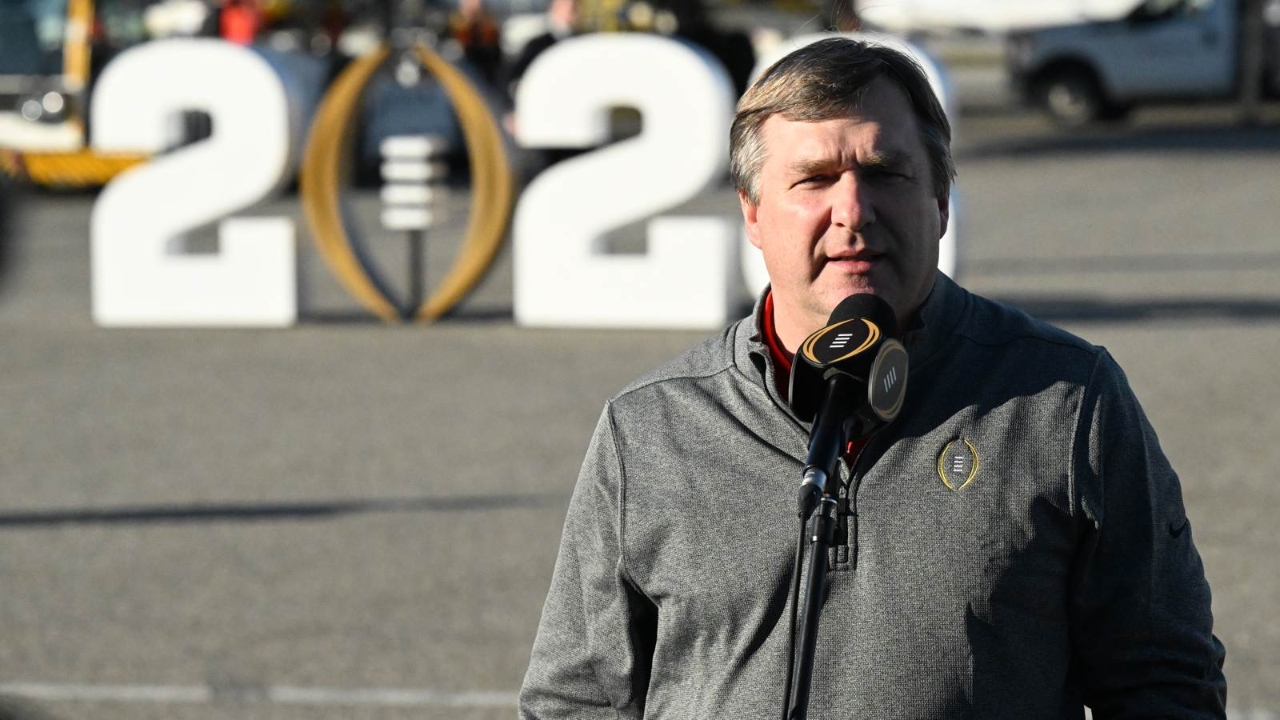
Real Georgia Fans Don’t Miss the Dawg Post Newsletter - Sign up now!
Los Angeles, CA - Georgia Bulldog head coach Kirby Smart spoke with reporters on Saturday about their big 2023 CFP National Championship game against TCU.
Q. What did you learn about your team this year coming into this season and how you guys were able to grow and get to this point?
COACH SMART: We learned a lot about our team. It's one of those things I think every year you do. The journey is what we do this for.
You think about this time last year, who we were and who we are now, it couldn't be further from the same team, just very different mental makeup, physical makeup, very different path to get here.
But the journey is what it's about. And these guys have everything we've asked. I've just been so pleased with the mental makeup and the character of this team. They've embodied everything we've asked them to do.
It's funny, now you start making plans for next year of what you're going to do when you get back and when you start workouts. We were doing the same thing this time last year and had no clue who we did this for.
Q. Couple things about recruiting. You'll go after the best players in the country, but because you have such a good recruiting footprint around you is there something strategic about your decision to reach into a Texas for an AD Mitchell or reach out to Brock Bowers? In other words, is it more than just they're the best players so we're going to get them?
COACH SMART: Well, nobody new who AD Mitchell was, what AD Mitchell had to an offer. AD Mitchell was more of a workout tape that he kept sending us. He's a unique situation. He's very different than Brock. Brock was recruited nationally, really highly. But every situation is different.
Our footprint is really good. When you look at the MVPs of our last game, Stetson Bennett and Javon Bullard, neither were very highly recruited. They're in-state players, really good high school players.
Look at Ladd McConkey, he was an in-state kid. Wasn't highly recruited. Our footprint is what our footprint is. We go after the players we think fit our culture. And that's more important than where they're from.
Q. One quick follow-up on that. We hear about Georgia's highly rated recruits and developmental program like TCU. Aren't all programs developmental programs to a certain degree? When you hear that, what do you think?
COACH SMART: Don't all programs also recruit? I think it's -- the truth lies somewhere in the middle. It's a narrative that gets put out there. But I tell our players about it all the time. Our best players on our team are not our most highly rated players.
We've got four or five guys that were not -- they're really good football players. TCU has a team full of really good football players. And I watch those guys play and the way they play is so much more important than worrying about high school, who cares?
Our players respect football players, and they respect football players on our team, whether they were a 2 or 3 star and respect players on the TCU's team, whether they were.
Q. You guys lost 15 players to the draft and 13 to the transfer portal last season. Which player has stepped up the most this year after losing a large pool of players?
COACH SMART: There's no way I could name one. That's impossible to single out one guy. I think a lot of the guys that contributed last year improved, meaning they got better. So they made themselves better.
And a lot of guys who didn't contribute at all contributed this year. That guy over there got better. He was a major factor last year. Kenny McIntosh, to me, was a major factor last year but he got better.
Q. Update on Darnell and Chambliss?
COACH SMART: Hopefully they'll play. That's really hard to say. We haven't done much since then, since we've been at home. I'm hopeful those guys are able to play and help us. Those guys want to play. I promise you that.
Exclusive offer for followers of Dawg Post! Limited quantities remaining ~ offer good while supplies last. Enter this special code: DAWGPOST23 to get 30% off this item:
Q. How much more difficult has it got to coach defense with each season? We saw the high-scoring semifinals and you being a defensive guy does it frustrate you when you see scores like that in a semifinal setting?
COACH SMART: I don't know if "frustrate" is the right adjective, but there's something along those lines. You feel, okay, when is good defense going to be played in a semifinal or a final for that matter. I mean, I don't know.
Football has evolved to where offenses are definitely ahead of defenses. It just seems to expose itself more towards the end of the year.
I don't know if anybody can put a fingerprint -- I'm not trying to put a fingerprint on it right now, trying to stop the next play, trying to score on the next play on offense.
But I think it is a thing. I just don't know what causes it or what allows it. The conditioning levels may have something to do with that. And offenses have been ahead of defenses. We have seen a lot of high-scoring games.
Q. With the entire football community being affected by the Damar Hamlin injury, what were your initial thoughts on it? And have you addressed the team about it?
COACH SMART: Yeah, definitely. First of all, I have children who play sports. And that injury happens actually in hockey and baseball probably more often than football. But it scares me.
Thank goodness we have Ron Courson who is almost a 30-year athletic trainer, athletic trainer for me. He immediately reached out to me. We were studying, watching tape getting ready for TCU. He reached out and told me we need to address it with our team.
So the very next morning, first thing we did is we brought in a mental health specialist, we brought in an athletic trainer,
we brought in a team chaplain, and we prayed. We also addressed it from a mental health standpoint.
And then Ron educated players on exactly what happened and how rare, but it can happen and you have to have people in place to save lives.
What an incredible job they did on the scene to make sure that he has an opportunity to recover from it. So the education piece was important to us to ensure our players that safety measures are there.
Q. And the last question, when he came to, his first words were, "Did we win?" Now is that something that you can use as a motivational factor going into Monday, seeing what this player, what his teammates mean to him?
COACH SMART: Yeah, I don't think we'll use that as the motivating factor, but it just helps along, is a great sign. Certainly happy for he and his family.
Q. You're a perfect one to ask this age-old question. Is it harder to get there or harder to maintain?
COACH SMART: It's hard both. There's nothing easy about winning football, successful football programs. And it's harder than it's ever been to maintain. And it's harder than it's ever been to get there.
It's just culture with all the things on the outside that we deal with now, it's harder than it's ever been. That's why you see shorter coaching careers. You see coaches with the ability financially to step out because they don't love it. You see a lot of different things.
But I can't say whether one's easier than the others. You don't use comparisons in that regard. They're both really hard in their own right. Sustaining, maintaining versus achieving and climbing the mountain, both difficult.
Q. And I talked to Greg McGarity yesterday, the AD that hired you. What do you remember about the interview? You were well-prepared obviously but this was going to be the opportunity of a lifetime.
COACH SMART: I don't remember much. It was, I knew Greg. I knew a lot of people at Georgia. I knew President Morehead. I had a class with him. So it was a situation that I had prepared for for a long time. But I don't feel like the decision was going to hinge on an interview. It wasn't going to be one of those, do you answer it wrong, they wouldn't have been talking to me if they weren't interested.
I was really consumed with my position I was in and making sure I did it right for the players where I was working. That's so important to me that you don't put your career ahead of your team's.
Q. 20, 30 years from now when you're playing golf with your buddies and they ask you about Stetson Bennett's legacy to the program, what will you tell them?
COACH SMART: Well, I got a long story to tell you, I can assure you that. You think about the things he and I have been through, decisions made. I mean, from the recruitment process to his official visit to what will happen Monday night. I mean, where to begin?
It will be a long round of golf because there's a lot of history there for he and I. And I'm just appreciative of the way he's handled everything and really what he stands for.
Q. What's the vibe with the team thus far? You guys are here, ready to complete the mission. What will it take to come out victorious?
COACH SMART: Well, the same thing it does in every football game -- who can control the line of scrimmage, who can be explosive, who doesn't turn the ball over. The game never changes. You just have more cameras here. You have more people viewing, bigger stage, a lot further away from home. But football's football.
And our guys prepare for that really all year. So we've got to go play a really, really good football team and we'll have to play one of our best games of the year to be able to compete.
Q. Have you all used the word "repeat" around the building at all? Have you all said it?
COACH SMART: No. I mean, it's never about that. I mean, we've never said "repeat" or "defend." We hunt, and for us we want to be staying on the aggressive side of things.
Again, I've been a part of so many years where I came off a win, that that wasn't the narrative. This team is not that team. Next year's team won't be this year's team. So they're completely independent of each other, just like every game is independent of the previous.
We don't dwell in the rearview mirror. We try to focus on what's ahead.
Q. I was actually fortunate enough to speak with Mike Leach a few weeks before he passed. And he was telling me a story about recruiting you as a young
student-athlete at Valdosta State. What do you recall about that? And can you speak to just the way his aura is going to hang over the sport going forward?
COACH SMART: He was at Valdosta State and my dad was a high school coach. So we were about an hour and a half, where I grew up, from the program he was at. There were a lot of kids that went from my high school where my dad coached, that went and played at Valdosta State.
So it was kind of a cradle of coaches at the time. A lot of coaches had come through there. They did recruit me. He didn't personally recruit me but his staff, the staff there. I was defensive player. He was an offensive coach. So they had a tremendous staff.
But my experiences with Coach Leach were just different. I mean, we played them the COVID year. Nobody warned me that before the game when you went and talked to him that he would talk. And he would talk. And he would talk.
And I got worried because you've got time limits to do what you've got to do pregame. And I couldn't break away from the conversation. We had run out of time. I had to go be with our team. I'm, like, I gotta go; this guy's still going.
Then this year I was a little more prepared. And I thought, okay, I'm going to have my time, allow me to get away. I found myself again, I couldn't get away. He was talking about South Florida, a place where he goes, how he's going to go down there after the season.
I kept looking at the clock; I can't get away from this guy. He's unbelievable in his ability to carry a conversation and just talk about anything.
But really I've enjoyed all the stories that have come up all on social media where people talk about their experiences, interactions with him and to read all the different ones, it's really cool.
Q. Curious, as you look back over your tenure at Georgia, how do you get to the point where you said this is what I want our offense to be, this is what I want it to look like, how explosive I want it to be and multiple --
COACH SMART: I don't know that I -- I don't know that I completely defined that. That's an area that you do based on who you have on your team.
When you have Nick Chubb and (indiscernible), who I think are two first-round backs, you might look different than what you have Brock Bowers, Oscar Delp, Darnell Washington tight ends. And then you've got wideouts.
So we've evolved to fit who we have on offense. Do you have to be explosive? Yes. But everybody's explosive in different ways. LSU was one of the most explosive teams I've ever played against, in 2019, and they were different than us.
Alabama, the year they had the four, five first-round wideouts, they were explosive in different ways than LSU. Everyone has their way of being explosive.
And that kind of evolves based on how your offensive coordinator wants it to. And our guy does a tremendous job.
Q. You've been a coach for a really long time, been around some really great coaches. How much do you lean on that advice and that experience in clutch moments like this? And what coach gave you the best advice and who was it?
COACH SMART: All coaches, I think we all plagiarize. I give a lot of credit to my father who was my first coach. And I grew up under his tutelage. And he meant a lot to me as a coach.
And then Coach Bowden impacted me a lot. Coach Chris Hatcher, Coach Richt. And I was with Coach Saban the longest.
I think you learn different things from different people. And I learned a lot from each one. So the impact has kind of made me who I am. And now you can't stop learning. You never -- you're green, you grow. And when you're ripe, you're ripe. You never want to be ripe.
For me, I learn from my coaches. When you bring new coaches in, you're able to gain things from them, maybe how they do things or you go to other schools and you study how they do things.
I'm infatuated with coaches across the country who do an incredible job and you want to go visit them and see how they do it to make sure you keep getting better.
Q. There's always, sometimes, a level of resistance when a new regime, new coach comes in to a program.
How much did you expect that in 2016? How much did you sense it? And then also when did you sense that it sort of started to turn?
COACH SMART: When did you sense what?
Q. That it started to turn around, basically.
COACH SMART: I didn't sense any resistance when I got there. I felt like I knew the culture I was coming into because I had coached on that staff. So it wasn't like, okay, we're going to say everything you did was wrong and everything we do is right.
And I explained when I got there that there's a difference in the way we're going to do things than what they had previously done. Those were beliefs I had.
And that I needed everybody to buy into them because I believed it would work if we did it a certain type of way. But I never made it about -- I told our coaches, it's never about the other staff versus this staff. We've got multiple guys now on this staff that were on that staff.
So it was never us against them. I think that could be really negative when you have a new coach come in and they talk about the old coach because there's a level of loyalty there by the kids.
I went through that as a player when I had different head coaches. So we were very sensitive to that. I didn't feel any resistance to the buy-in to what we did. It was different what we did. And it was a tough first year because there was a little change the way we did some things, plus we couldn't practice at our normal facility. But I feel like there was a lot more buy-in the next year because the players were really elite leaders -- we had some really good leaders that year, 2017, that pushed us over the edge.
Q. There's always a lot of talk of the quarterback/coach relationship, and quarterbacks and coaches are just always linked now. How different do you think it's going to be next year without Stetson who you've spent a lot of time with doing things over the past couple of years? Do you think you guys will have a friendship or bond going forward after the season?
COACH SMART: Talking about Stetson?
Q. Yes.
COACH SMART: Oh, yeah, I'll have a friendship with every kid that leaves our program. I get texts all the time from the guys that left in the last two, three years, reaching out. I mean, I keep a relationship with them.
It's very important to me that when a young man leaves our program, they understand we are here for them. Not everybody's going to the NFL. People think our kids go to the NFL forever. It's short-lived. We've got guys that play for us, went to the NFL and are already out. And I want to help them be successful in life. So that relationship with Stetson and whoever else, Kenny McIntosh, for that matter, is going to be long-lived and very important to me.
As far as who takes over that seat next year, I'm not concerned with that right now. I know it will take its course and we've got a lot of time to prepare for that.
Q. You mentioned your dad. In what ways do you coach like him, and in what ways do you coach differently from him?
COACH SMART: He's a really special man to me. Unfortunately, he's not going to be able to make it to the game. He's had some medical stuff. It hurts me that he and my mom won't be here. But I know it's the right decision for him. He's been at almost every, in terms of home game in Athens, playoff games. It's tough that he's not able to make it.
Nothing worse than watching your parents grow old. It's like taxes; it's inevitable. They're going to get old. And that's been tough.
But he's taught me so much just about the way you handle things, the right way, the wrong way. Control the controllables. The moment's never too big if you're prepared. And I always watched the way he prepared our teams and our staff in high school. He was a very wise man, a man of few words. I tried to follow his mantra as a coach.
I've certainly evolved from going to coach for other people, but a lot of my core beliefs came from the way he ran our programs in high school.
Q. What stands out to you about this kind of unique TCU defense and how much of a challenge it can present for you guys?
COACH SMART: I don't think enough is said about the way they play. First of all, Joe Gillespie is unbelievable in what he does. People try to paint this picture that it's the Big 12 defense. They're not exactly like other Big 12 defenses. They're very unique.
We studied him at Tulsa. He did an incredible job at Tulsa. When he played Cincinnati, in the Peach Bowl, he was thedefensive coordinator at Tulsa. They had done the best job against Cincinnati and had really stoned them in this defense.They have incredible toughness, keys. I can't say enough about what they do because what they do is so different,
I associate it to being a triple option offense. When you go play them you can't do what they do as good as they do it. We're trying to do what they do on our defense. It's completely different. It's a concern because they're unique in what they do and they gave Michigan some problems in what they do.
So a lot of credit to what they do. We'll have to prepare well for it. We'll have to adjust in-game to it. But it's the way his kids play. They play with extreme physicality. If you don't bring the contact they will bring the contact to you.
Q. You talked about your dad. I'm going to ask you, in a profession that keeps you away from your kids so much, what's it like to have Andrew around and want to be around and be such a part of this team?
COACH SMART: It's awesome. I worry more about my other two that don't really -- they don't care to be around it. They're older. They didn't immerse themselves in it. They don't love football. They love what football brings with the trips and the chances to go places, but they don't love football.
He loves football. He likes contact. He enjoys the relationship with the players. He's got a very different personality than them. So it's great because that gives me somebody with me. But I have to work really hard to spend time with my other ones because I spend so much time with football that he's around it, I end up getting more time with him.

